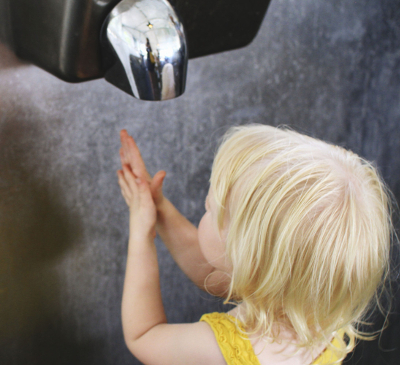Hand dryers form germ jetstream
 A new study has shown once again that hand dryers propagate and disseminate germs and bacteria at a far greater rate than the humble paper towel.
A new study has shown once again that hand dryers propagate and disseminate germs and bacteria at a far greater rate than the humble paper towel.
This includes the recently-popular jet-style hand dryers, such as the Dyson Airblade.
But as all forms of jet hand dryers rise in popularity, researchers in the UK say they are far less sanitary than the traditional paper towel dispenser.
A study led by Professor Mark Wilcox from the University of Leeds found that jet hand dryers spread 27 times more bacteria and microbes than paper towels, and four times as many as standard hand driers.
The researchers tested the volume of microbes spread using participants wearing gloves soaked with lactobacilli - a safe and benign bacteria found in yoghurt.
Participants dried their hands under a jet air dryer, the standard-style drier or a paper towel, and measured airborne spread of microbes.
Airborne microbes were picked as a critical channel of pathogen transmission in a bathroom environment, given that it is usually a quite confined space and in close proximity to other occupants.
“Next time you dry your hands in a public toilet using an electric hand dryer, you may be spreading bacteria without knowing it,” said Wilcox.
“You may also be splattered with bugs from other people's hands.
“These findings are important for understanding the ways in which bacteria spread, with the potential to transmit illness and disease.”
The study only looked at the airborne spread of microbes, and did not assess the actual hygiene of hands after drying
More sceptical readers may have to judge to validity of the method for themselves though, given that the study was funded by the European Tissue Symposium.







 Print
Print